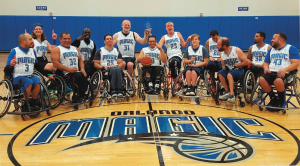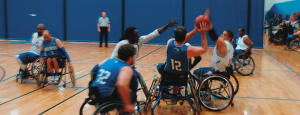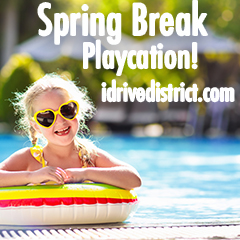This Is How They Roll
Orlando Magic Wheels basketball team are true champions on and off the court.
 Think it’s been ages since Orlando was a serious contender for a basketball championship? Think again. Earlier this year, the Orlando Magic Wheels traveled to Louisville, Kentucky, to compete in one of the biggest tournaments of their lives and—unlike their namesakes of late—did themselves and the city they represent proud in the process.
Think it’s been ages since Orlando was a serious contender for a basketball championship? Think again. Earlier this year, the Orlando Magic Wheels traveled to Louisville, Kentucky, to compete in one of the biggest tournaments of their lives and—unlike their namesakes of late—did themselves and the city they represent proud in the process.
What’s more, they did it all from the seats of their wheelchairs.
The Magic Wheels’ appearance at the National Wheelchair Basketball Association (NWBA) Championship Tournament for Division 3 (D3) play marked their first time there in 15 years, and it followed their victory at the 6th annual Wheelchair Basketball All- Star Tournament in February. They didn’t have the same level of success at nationals, losing a heartbreaker to the Las Vegas Yuccas in the final round of semi-finals, but it was still a victory in the team’s eyes—and finishing in the NWBA’s Final Four is nothing to sneeze at. “It was awesome and amazing for the Orlando Magic Wheels to win fourth-place national in Division 3,” says team member Connie Sloat, who plays center and forward as needed.
Besides, as team leader Jim Moore notes, they achieved something far more important than a trophy or medals. “After the game, our own 18-year-old high school senior Emily Clarke signed a letter of intent to go to the University of Texas, Arlington,” he says. “Her college scholarship to play wheelchair basketball with the Dallas Rollin’ Mavs was one of the objectives we had for this tournament.” Another of the team’s younger players, 23-year-old Jake Crespo, is also being pursued by several colleges to play wheelchair basketball, with his sights set on the University of Wisconsin.
These successes highlight the team’s true goal: providing opportunities for physically challenged athletes to shine in a fast-paced, competitive team sport. In that regard, the Magic Wheels have been champs for more than 20 years, and they look to continue that streak for a long time to come.
The Magic Wheels are backed by the nonprofit Orlando Wheelchair Games Inc. (OWG), which was founded in 1992 by Roger and Mary Paul Davis. From day one, they worked to encourage and guide the development of physically disabled athletes, both novice and experienced, to achieve high levels of performance while practicing good sportsmanship. The Magic Wheels debuted in 1994. At that time, the Davises established a partnership with the Orlando Magic, who, in addition to providing the team with jerseys, gave financial support for several years.
“Sometime in the 2000s, the Orlando Magic switched their charitable focus to their Youth Foundation,” says Moore. “Since then, we have received no financial support from the Orlando Magic. We do receive ‘in-kind’ donations of new game jerseys every couple of years.”
Moore, who lost his leg playing semi-pro football in 1977, never let that tragedy slow him down—literally. He’s run more than a dozen marathons on a prosthesis, among other activities. When he was 50, he attended a disability expo when he ran into a Magic Wheels representative. “She said, ‘You’re tall, in good shape and have one leg. Have you ever played wheelchair basketball?’” Moore recalls. “I told her I’d never even been in a wheelchair. So, I was invited to a practice and enjoyed it so much that I have been playing ever since.”
About 10 years ago, he was asked to step up as the team’s leader. He wears a lot of hats in that role, including player, coach, manager, scheduler, social-media coordinator and even treasurer. “This turned out to be a daunting task from a financial and coordination standpoint,” he says. “However, I firmly believe that to stay young, you must stay active and associate yourself with young and active people. Doing everything I do for the team gives me one venue to practice my philosophy on a regular basis.”
Today, the D3 Magic Wheels team plays in the NWBA’s Developmental division and the Florida Wheelchair Basketball Conference, and they’re always looking for new players. Anyone with a lower-limb disability who’s coordinated enough to push a wheelchair and hold a basketball is a candidate. Although it’s not required, being in good condition is a bonus, but players must at least be in high school to join. There are no upper age limits.
Sloat’s association with the team started when she was invited to a basketball camp at Valencia College 20 years ago. To say the least, the experience was life-changing. “Every day, I practiced by myself at the local YMCA for five years just so I could get used to playing in a wheelchair,” she says. “Then I became a starter.”
While Sloat gives a lot to the team, she also gets a lot out of playing with the Magic Wheels. “The people I play with, I treat them like my other family I never knew I had,” she says. “I enjoy the time and experience of being part of the other side of life with disabilities and helping others learn the sport of wheelchair basketball.”
How to Help—and Play
Given the nonprofit status of the team’s backer, they’re always on the hunt for support. “We rely solely on donations and fundraising activities to sponsor the team,” says Moore. “Volunteers are also helpful.”
Tax-deductible donations, including program and tournament sponsorships, can be made through OWG, but as Moore indicated, they have needs beyond money. Gifts of bottled water, Gatorade, snacks and other forms of in-kind support help their annual home tournament, held at the West Orange Recreation Center, as well as other exhibitions they host in town. And in addition to volunteers, they’re currently accepting applications for OWG board members.
Like any competitive team, they’re also on a constant hunt for fresh talent. Accordingly, anyone who meets the criteria is welcome to join them at their weekly practices, which are held on Tuesdays from 6 to 8 p.m. at the Silver Star Recreation Center in Orlando. That invitation is even extended to people who have never previously touched a basketball.
“We are always looking for new players…,” says Moore. “So, while trying to win games within our division, we are also focused on developing wheelchair basketball skills for new players.”
“Just come out and give it a try,” says Sloat. “You’ll never know what you can do in a chair until you try. It takes a lot of hard work, and you will make it or break it.”
Continuing, Sloat adds: “Each person has their own disability, but you don’t look at that. You look at their heart and help them out the best way you can to make their life a little easier.”
To learn more about the Orlando Magic Wheels, Orlando Wheelchair Games Inc. and how you can help, visit OrlandoMagicWheels.org.
This article originally appeared in Orlando Family Magazine’s May 2017 issue.









